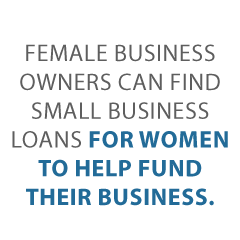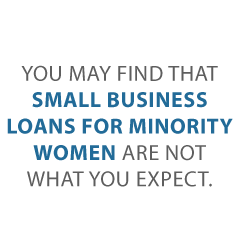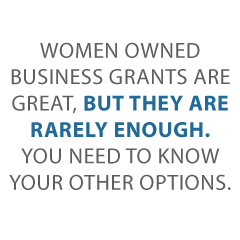It’s no secret. Minorities suffer challenges that are unique to them. Certainly, one of those challenges is how hard it is to find business loans for minority business owners. So,how do you find loans for minority business owners?
The 8 Best Business Loans for Minority Business Owners
To clarify, not all of these loans are loans only for minority business. Nonetheless, they all tend to work well for minority business owners.
1. SBA 7(a) Loans & 8(a) Business Development Program
These loans are open to all small business owners. However, if a minority business owner takes part in the SBA Business Development program, they increase their chance of getting this type of loan.
Honestly, about 80% of SBA loan applications from Hispanic and African Americans are for $150,000 or less. This is according to the SBA itself. Surprisingly, these smaller loans seem to be harder to get. Honestly, this is probably because lenders don’t make as much money from them.
In fact, in late 2018, the SBA got rid of the 2% fee for loans that are less $150,000 to help with this.

Keep your business protected with our professional business credit monitoring.
2. SBA Community Advantage Loans
These are to meet the needs of small businesses in neglected markets. Of course, that includes minorities. The goal is to get local lenders to increase loans up to $250,000. It does this by backing up to 85% of the loan amount. It helps small business owners who might not be able to get traditional financing.
3. SBA Microloan Program
First, business loans for minority business owners go up to $50,000 through this program. Secondly, funds come from a third-party lender. Usually, these are community nonprofit organizations. Often, they offer management and technical assistance to business owners alongside the loan. These loans are available to all small business owners.
4. Accion U.S. Network
Accion offers loans in all states. Funds are available to the following:
- minorities
- veterans
- women
- those with disabilities
- and low to medium income business owners
Generally, loan amounts start at $200,000 and go up to $300,000. In addition, Accion can put owners in contact with others to help build a network of support.
Comparatively, the minimum credit score for these loans is 575. Also, you cannot be 30 days late on paying anything. Finally, you will not qualify if you have any late rent or mortgage payments over the past year.
5. Union Bank Business Diversity Lending Program
This program from Union Bank offers business loans for minority business owners. Indeed, this one is specifically for minorities. In fact, to qualify, you must be Hispanic, American Indian, Latino, Asian, Alaskan Native, African American, Native Hawaiian, or other Pacific Islander.
Furthermore, a business that makes up to $20 million could qualify for a loan of $2.5 million. However, you must be in business for at least 2 years. Likewise, the minority business owner must own at least 51 percent.
6. The National African American Small Business Loan Fund
This is a partnership between JP Morgan Chase and the Valley Economic Development Centers . It serves small businesses with minority owners that are in low income or medium income communities. However, only those in New York, Los Angeles, and Chicago are eligible.

Keep your business protected with our professional business credit monitoring.
7. Business Center for New Americans
Presently, The Business Center for New Americans offers minority business loans of $5,000 to $50,000. They work with immigrants, refugees, women, and other minority entrepreneurs. They work with minority business owners who have not been able to get traditional financing.
8. Camino Financial
Camino Financial is an online lender. In like manner, they offer business loans for minority business owners. Conveniently, their entire application process is online. Microloans range from $5,000 to $50,000. In addition, they also offer small business loans between $10,000 to $400,000.
Loans for Minority Business Owners: Other Options
Chances are, you are going to need funding from more than one source. Of course, loans are the top option, with grants coming in a close second. Don’t underestimate angel investors and crowdfunding however, as they definitely have their place.
The thing is, funding isn’t just a one and done thing. You are going to need funding throughout the life of your business. As a result, you need to make sure you have access to the most and best possible funding options available. To do this, you must work on fundability.
Loans for Minority Business Owners and Fundability
Unlike many things in the world, the factors that affect fundability are the same for everyone. It doesn’t matter if you are a minority or not. What is fundability?
Fundability is the ability to get funding for your business. How does a business become fundable? What makes this answer complicated is that there is so much it must cover. Sure, a great business credit score is important. In addition, many of the aspects necessary for a strong business credit score are necessary for fundability as well. There is so much more though.
A potential creditor needs to see that your business is legit and profitable. Many loan applications are denied approval due to fraud concerns. Something as seemingly unimportant as an address that hasn’t been updated can cause a problem.
Still, it’s best to start at the beginning. Before you can build fundability at all, you have to have a foundation of fundability.
The Foundation of Fundability for Loans for Minority Business Owners and More
The foundation of fundability is in how your business is set up. It has to be set up to appear to be a fundable entity separate from you, the owner. How do you accomplish this? Well, like any foundation, it is best to start at the beginning. It will be faster and easier if you do. However, if your business is already up and running, then you may not have that option. That’s okay. It’s never too late to start, but start now. For several reasons, the longer you wait the harder it will be.
To have a fundable foundation you will need the following.
-
Separate contact information
-
A dedicated business bank account
-
All the proper licenses
-
A professional business website
In addition to a fundable foundation, there are many other factors that can and will affect the fundability of your business.
Business Credit Reports
These are much like your consumer credit reports. Except, they detail the credit history of your business. Chiefly, they help lenders determine how credit worthy your business is.
Basically, the main sources of business credit reports are Dun & Bradstreet, Experian, and Equifax. You have no way of knowing if your lender will choose to use one of these agencies, or another, less commonly used option. To that end, you need to make sure your reports with all the credit agencies are up to date and accurate.

Keep your business protected with our professional business credit monitoring.
Other Business Data Agencies
In addition to those agencies that directly calculate and issue credit reports, there are other business data agencies that affect those reports indirectly. Two examples of this are LexisNexis and The Small Business Finance Exchange. They collect data from a variety of sources. These include public records. This means they could even have access to information relating to automobile accidents and liens. Honestly, you probably will not be able to access or change the data these agencies have on your business. Instead, you should focus on making sure new information they receive is positive. Enough positive information can help counteract any negative information from the past.
Identification Numbers
In addition to the EIN, there are identifying numbers that go along with your business credit reports. You need to be aware that these numbers exist. Some of them are simply assigned by the agency, like the Experian BIN. One, however, you have to apply to get. It is absolutely necessary that you do this.
Dun & Bradstreet is the largest and most commonly used business credit reporting agency. Every credit file in their database has a D-U-N-S number. To get a D-U-N-S number, you have to apply for one through the D&B website.
Business Credit History
This is where the rubber meets the road when it comes to credit reports. Your business credit history has everything to do with everything related to your business credit score. That in turn, is a huge factor in the fundability of your business.
Your credit history consists of a number of things including:
- How many accounts are reporting payments?
- How long have you had each account?
- What type of accounts are they?
- How much credit are you using on each account versus how much is available?
- Are you making your payments on these accounts consistently on-time?
The more accounts you have reporting on-time payments, the stronger your credit score will be.
Business Information
On the surface, it seems obvious that all of your business information should be the same across the board. However, things slip through the cracks when you make changes. An address or name change can cause a problem if you don’t change it on everything.
A ton of loan applications are turned down each year due to fraud concerns simply because things do not match up. Maybe your business licenses have your personal address but now you have a business address. You have to change it. Some of your credit accounts could have a different name or phone number listed than what is on your loan application. Do your insurances all have the correct information?
The key to this piece of the business fundability is to monitor your reports frequently for mistakes and updates.
Financial Statements
This encompasses a broad spectrum of things. First, there is the obvious. Both your personal and business tax returns need to be in order. Not only that, but you need to be paying your taxes, both business and personal.
Business Financials
It is best to have an accounting professional prepare regular financial statements for your business. Having an accountant’s name on financial statements lends credence to the legitimacy of your business. Have professional statements prepared at least annually.
Personal Financials
Often tax returns for the previous three years will suffice. Get a tax professional to prepare them. Remember, this is the bare minimum you will need. Other information lenders may ask for include check stubs and bank statements, among other things.
Bureaus
There are many other agencies that hold information related to your personal finances. You need to know about them as well. Everyone knows about FICO. Your personal FICO score needs to be as strong as possible. Most traditional lenders will look at both personal and business credit.
In addition to FICO reporting personal credit, you have ChexSystems. In the simplest terms, this keeps up with bad check activity. And it makes a difference when it comes to your bank score. If you have too many bad checks, you will not be able to open a bank account. In turn, that will cause serious fundability issues.
For this point, everything comes into play. Have you ever been convicted of a crime? Do you have a bankruptcy or short sell on your record? All of this can and will play into the fundability of your business.
Personal Credit History
Your personal credit score from Experian, Equifax, and Transunion all make a difference. You need good personal credit. Certainly, it will affect the fundability of your business. In fact, now is the time to work on it. Don’t wait. The number one way to get a strong personal credit score, or improve a weak one, is the same. It’s to make payments regularly on time.
Also, make sure you keep an eye on things. Correct mistakes. Make sure there are no fraudulent accounts. Just keep a general eye on things.
Application Process
Finally, even the application process can affect fundability. First, consider the timing of the application. Is your business currently fundable? Next, make sure your business name, business address, and ownership status are all verifiable. Lenders will check. Lastly, make sure you choose the right loan. Do you need a traditional loan or a line of credit? Would a working capital loan or expansion loan work best for your needs? Choosing the right product to apply for is important.
Loans for Minority Business Owners: Build Fundability
There are some specific business loans for minority business owners available. Nevertheless, the better option is to build fundability to increase your chances of approval for all funding options. Obviously, the more fundable your business is, the better. Look for minority loans. Simultaneously, work on a fundable foundation. Then, keep working. If your business is fundable, it can get the funding it needs to thrive and grow into the future.
The post Top Business Loans for Minority Business Owners appeared first on Credit Suite.













